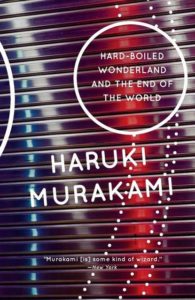
Hard-Boiled Wonderland and the End of the World
By Haruki Murakami
416 pages
Paperback published in 1993 by Knopf Doubleday Publishing Group
This was my book club’s book for October. I’d heard of the author. And Suzanne, my partner in my art business, is a fan. Still, I probably wouldn’t have read it were it not October’s selection. (There are probably 600 titles on my “must-read” list. If I get to half of them before I die, it will be a miracle.)
There are two plots in the book – one in the even chapters, the other in the odd chapters. The first takes place in the Hard-Boiled Wonderland; the second in the End of the World. Usually, this sort of narrative device is made obvious through the chapter titles or at least the characters’ names. But here, it was obfuscated, since each story is told by an unnamed narrator. It took me several chapters to figure it out.
In the Hard-Boiled Wonderland, the narrator describes himself as a Calcutec, someone trained to do computer-complex data encoding, which he encrypts through his subconscious mind. In the End of the World, the narrator is being trained as a dreamreader, someone that reads residual memories from the skulls of unicorns… or something like that.
If that has you thinking “far out,” you should know that the stories also include a mad scientist working on “sound removal,” his chubby and flirtatious granddaughter, a rapacious librarian, a pair of incompetent mobsters, an underground labyrinth, subterranean monsters, living shadows, a gatekeeper that guards them, and a miniature accordion that is the key to the End of the World.
What I Liked
Notwithstanding the complexity of the action and the opacity of themes, both narratives are engaging and fun to read. As a whole, the book has the pace and forward momentum of a page-turner. Also, the narrator of the Hard-Boiled Wonderland plot is infatuated with Western culture, which allows the author to pepper the narrative with familiar Western references. The plot and dialogue seem to be influenced by paperback detective stories, in the mode of Raymond Chandler. The End of the World plot is fantasy fiction along the lines of Kafka.
What I Didn’t Like
The novel is promoted as a “deep dive into the very nature of consciousness,” and several critics praise it for that reason. I didn’t find anything deep in the sections that talked about consciousness. Instead, I found the sort of ideas you’d expect to find in a 1950s science fiction movie or a comic book.
The Takeaway
If you like fantasy fiction, whodunits, or even magical realism, you may like this book very much. If, like me, you don’t, you may still enjoy the book, but probably not as much.
Critical Reception
The novel has received critical acclaim both domestically and internationally. Here are some examples:
* “Murakami’s bold willingness to go straight over the top [is] a signal indication of his genius… a world-class writer who has both eyes open and takes big risks.” (The Washington Post Book World)
* “Rich in action, suspense, odd characters, and unexpected trifles… [a] provocative work.” (The Atlantic)
* “Murakami’s gift is for ironic observations that hint at something graver…. He is wry, absurd, and desolate.” (Los Angeles Times Book Review)
* “Off the wall… hilariously bizarre… splendid… a remarkable book.” (The [London] Times)
